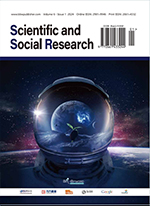Abstract
The purpose of this study is to understand the characteristics of Aristotle’s view of nature that is, the staticview of the universe, and find implications for education. Plato sought to interpret the natural world using a rationalapproach rather than an incomplete observation. He thought that viewing the world from the perspective of geometry andmathematical regularity was the best way to understand the world. On the other hand, Aristotle believed that we couldunderstand the world through observations. His worldview portrayed a static reality, imbued with individual purpose anda sense of deliberate legitimacy. In addition, the natural motion of earthly objects and celestial bodies, which are naturalmovements towards the world of order, are the original actions. Aristotle thought that all natural things would carry outsome movement. Above all, Plato and Aristotle view the world as a static universe. It is possible to fully grasp the worldby approaching the objective nature that exists independently of human beings with human reason and observation.After all, for Aristotle, like Plato, their belief that the natural world was subject to regular and orderly laws of nature,despite the complexity and seemingly unceasing changes, became the basis of Western thought. The universe, rooted inthe metaphysical perspective of ancient Greece and carried forward in modern philosophy, has traditionally depended ondeveloping a dichotomy of comprehension, distinguishing between what is already accomplished or predetermined, theideal and the inevitable. This dichotomy forms the foundation of traditional teaching methods that often do not prioritizethe opinions of learners.
References
Rifkin J, 2016, Entropy: Into the Greenhouse World [Lee C, Trans.], Sejong Institute, Seoul.
Joo K, 2007, A Historical Review of Ontology. Kokito, 62: 217–248.
Cohen IB, 1985, The Birth of a New Physics (Revised and Updated), W.W. Norton & Company, Inc, New York.
Whitehead AN, 1926, Science and Modern World. Cambridge University Press, Cambridge.
Lovejoy AO, 1984, The Great Chain of Being: A Study of the History of an Idea [Cha H, Trans], Kaesangdang, Seoul.
Choi J-C, 2005, The Origin of Species (Seoul National University Basic Education Center Edition), Seoul National University Press, Seoul.
Cha H-S, 1994, A Study of Western Modern History, Kaesangdang, Seoul.
Han J-K, 2019, The Study of Substance: A History of Western Metaphysics, Ewha Womans University Press, Seoul.
Han J, 2018, An Introduction to Kantian Philosophy (7th Edition), Seogwangsa, Seoul.
Oh J-Y, 2019, The Philosophical Worldview of Ancient Greece and the Middle Ages in the West, and the Influence of the Scientific Worldview in Modern Times, Yonsei University Press, Seoul.
Guthrie WKC, 2016, The Greek Philosophers from Thales to Aristotle [Park J-H, Trans.] Seogwangsa Publishing, Gyeonggi.
So K-H, 2008, Natural Ontology: Natural Science and the Problem of Truth, Munye Publishing House, Seoul.
Oh JY, Han H, 2022, Understanding Mathematical Abstraction in the Formulation of Galileo’s Law. History of Science and Technology, 12(1): 55–68.
Woodfield A, 2010, Teleology, Cambridge University Press, Cambridge.
Davis B, 2016, Complexity Education Beyond Constructivism and the Genealogy of Ecological Education (2ndEdition) [Sim I, Trans.], Bookseed C.I.L.
Henry J, 2012, A Short History of Scientific Thought, Palgrave Macmillan, London.
